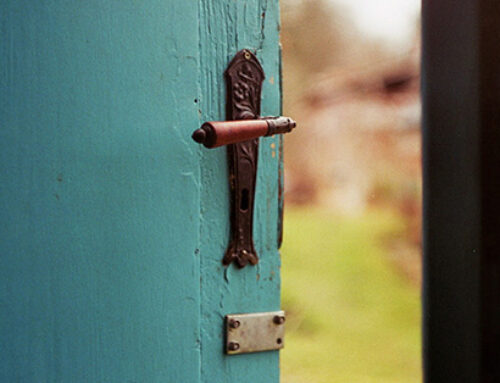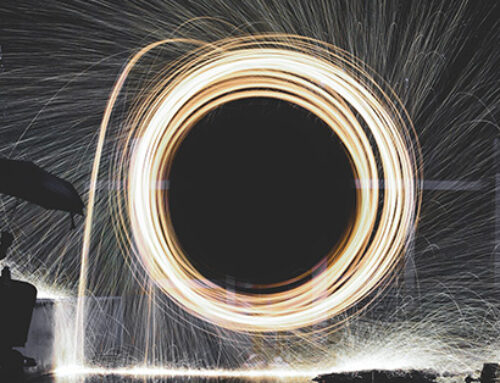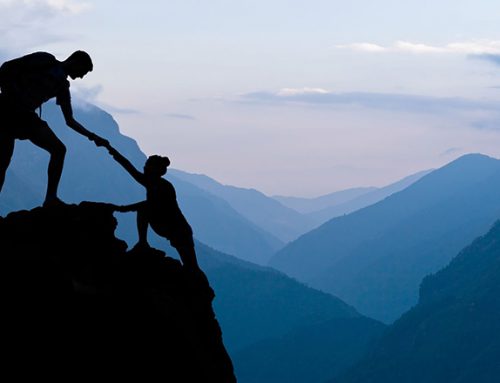My life burned to the ground two years ago. Within the space of a week I lost my job, my relationship of 9+ years and my house.
Ok, ok: I called in sick, broke up with my boyfriend and left him to stay in our house & with the cat. But still, you know. Overnight, things changed considerably.
Until that moment I’d say I was pretty friggin’ uptight. A smart, perfectionist, über-busy, nit-picking, judgmental procrastinator, to rattle off just a few adjectives. With that, I somehow managed to be quite successful in my job, relationships and social life. It worked for me. Until it became apparent that it didn’t anymore.
The ‘not working anymore’ took years to build up. I did stuff that mitigated some symptoms. I started to like my body, understood that my negative self-talk wasn’t helpful and/or true – even if that voice came from a deeply ingrained part of me that was trying to do the right things in the right way. I ate healthily and then didn’t and then did and then didn’t again.
I mostly lived in the awkward and frustrating space between (a) mentally understanding a new thing and (b) embodying it and consistently acting from that understanding.
FYI: the (a)/(b) thing will be a bit of a theme. What I call the in-between space has significant parallels with the ‘conscious incompetence’ phase of the four stages of competence model.
I had big openings in personal development workshops and then got stuck again. I met lovely people and then hid from them. I slowly became interested in my needs and desires and then stared blankly into space while ignoring them.
My resistance to change was quite epic, really.
So I pushed on.
Every month I caught myself thinking: “Once this project is finished, things will slow down. I’ll have time to take a breather and start on things that I’ve been itching to take on and work will be much more fulfilling.” Don’t get me wrong, I’m all for hanging in there. But somewhere I realized ‘hanging in there’ shouldn’t be my daily reality.
I’ve described the time leading up to burning out as crashing into a wall in slow motion. It might have been too late to hit the brakes, but I did turn the wheel a bit: asking for help, delegating some tasks, shifting just enough within my paradigm (of not being good enough) to prevent a head-on collision.
Then I gave in.
I distinctly remember the moment I realized how arrogant I’d been to think I was going to usher in a new era for my organization. How I really wasn’t as indispensable as I liked to think. When the company’s social worker held up this particular mirror to me during an emergency session, the ground disappeared from under me for a few seconds. Then it actually felt like a relief. And I was surprised that it really only took a few seconds of ‘no ground’. I could let go into the truth of my dispensableness and arrogance. Unable to un-see it, whatever motivation I had left to keep pushing on dissolved instantly.
Everyone and their dentist had seen it coming. I had burnt out.
Fortunately, because I had started to turn the wheel, the crash was more sideways than head-on. And I could accept it once it happened; I judo-rolled with the force of the blow and just tried to shield my soft bits until I came to a stop.
It was totally obvious that in that state I couldn’t do my job. My brain seemed the size of a matchbox and making coffee had me knackered for the rest of the morning. This inescapability took away the guilt and sense of uselessness that might have eaten at me. Which is probably why I didn’t also become depressed; a combination that happens a lot.
I already sort of grasped the notion that I must have some sort of intrinsic value (a), even if my output was zero. Now I had to live from that place (b), because I had none of the previous -unsatisfactory but at least existent- output to base that value on. And people still loved me and the world didn’t fall apart. Ha!
Finally, I chilled out.
Permanently losing my energetic reserve tank, as well as roughly 15 IQ points, was a blessing. That’s as corny as it is hard to believe, but no less true.
I couldn’t say ‘yes’ to everything that fit in my calendar anymore, which meant I had to choose. And increasingly, I chose the things that I really, really wanted to do.
My friend Stephanie Lisa Kelly calls this taking decisions based on a ‘Hell Yes! or No’. She coaches and writes something inspiring every day.
Any time I pushed myself -consciously or because I slipped back into my old default setting- my body gave me the immediate and non-negotiable feedback that “the thing I really should be doing” was not going to happen. I learned to cancel things, even at the last moment. Then I learned to prevent having to cancel things by being open about my unreliable energy levels, instead of in denial and/or ashamed.
Not only was it a blessing, I’d even go so far as to say that the time since I crashed was and continues to be the happiest period of my life. I’d known about a bunch of out of date internal programming for a while (a). Now that software got updated; this time without self-imposed deadlines under threat of paralyzing self-criticism. And my behavior followed suit (b).
Worries that would eat me alive now hardly register anymore. Chilling out is now my (almost) daily practice, not something I do to recover just enough to keep producing output.
To be sure: it helped that I have the good fortune of living in a country with good a social security system. So, though I was unable to work, I didn’t have to worry too much about money. Some more outdated programming reared its head: even though saw the money arrive in my bank account (a), this took a while to relax into the sense that I deserved it (b). My love and friends helped me realize I’d been paying social insurance fees for years, so I had a right to these benefits.
In hindsight, the groundwork for my new life -lots of (a) and bits of (b)- had built up over years. The burnout just leveled whatever was left of the belief structures that no longer served me. The groundwork for me consisted of family constellations, women’s work, meditative and therapeutic practices, Circling, and yes: tripping.
During one memorable trip I experienced my very first moment of unadulterated self-love. For a few seconds I ‘saw’ myself through others’ eyes (a) and realized that I was actually a beautiful and likable person. I felt compassion for this girl that was trying so hard, and saw that I have a place in the web of life – not what that place was, specifically, but that it existed. Somehow this moment established a new base line for me (b) and I never went back to the same level of self-doubt and self-criticism.
Over the years, every time I took psychedelics my worldview became a bit more positive. I’ve started to see people as basically interested, understanding, supportive, and doing their best while struggling with their own version of demons. Whether or not this is a realistic view of humanity, it just plain feels better than starting from a default of seeing them as distant, critical, unwilling, and selfish.
Brené Brown, the famous vulnerability and shame researcher, in her book Rising Strong writes beautifully about the question “whether people, in general, are doing the best they can”.
The feedback I got from all types of conversations I’ve been having, was that my way of being with people is touching, helpful and affirming. It led me to trust that my presence is of (intrinsic!) value when people are in vulnerable, potential-filled states. I’m not perfect, but I believe in lifting others as we climb. I try to do that by cultivating a combination of the qualities of a gardener, a midwife and a cheerleader.
Recently a client commented that I was exuding an open, content calmness. She asked me if I believed that such a way of being was also within reach for her. After a few breaths of receiving her compliment and appreciating the yumminess of that state, I told her what I just told you: that only a few years ago, I was hopped up on cortisol and adrenalin pretty much 24/7. And that literally zero people on the planet would have called me calm.
Her question had me look back, curious about what got me from there to here and whether elements of that path could be replicable. Here’s is what I’ve come up with for now:
- Having a practice (which weirdly turned out to mostly be a training in staying with not-knowing and other types of discomfort: helping me to gently embrace what comes up instead of acting it out or pushing it away – and Circling is the best way I know how to learn this)
- Having a partner, friends and wider community (and receiving their support AND challenges)
- Irregularly remembering to put attention on my body (which is usually just waiting to flood me with pleasurable sensations and show me where something’s up)
- Chilling out. Being ok with not having ‘arrived’ (not collapsing OR going into a frenzy)
“Slow is smooth, smooth is fast” is the US Special Forces motto that I learned from of my friend, coach and founder of a life-changing practice called We-Dreaming, Andrew Venezia.
- Believing in my worthiness while getting clearer on my purpose through an online course called Purpose Black Belt (working under the assumption that there is an overlap between what I like, what I’m good at, what is needed and what I can get paid for: Ikigai)
- Safely taking mind- and heart-opening substances from time to time (NB: no narcotics)
This is not an exhaustive list, and certainly not one I would claim to work for everyone, but it is my current answer. Note that taking psychedelics is the final bullet point. Without all the other points those experiences would not have had such a positive and lasting effect and just be fun memories.
By the way, I could write a blog about every one of those bullet points. I somehow found the restraint to keep my elaborations to one bracketed sentence each. You’re welcome.
Right. Not to “gold plate grit” (another of Brené Brown’s insightful phrases), but: yada-yada/fast forward 2 years, and hey presto! I found my current Ikigai. Guided Tripping sessions are honestly the most gratifying thing I can think of doing.
It’s nothing short of amazing to me to be invited to be with someone; care for them; accept every part of them; go deep and witness them shift something at the root of their story; support their translation of that shift into day-to-day life; and then hear them describe fundamental positive changes a few weeks on. I pinch myself every time I realize I now help people be more of themselves by being more of myself and doing what comes naturally.
At the same time, it’s super scary to step into the world and say that this is what I do now. I realize that not only is that ok; it’s actually good! The fear tells me that I care and that I don’t take my work for granted. Not that I should just stop before I begin, which was -and sometimes still is- my modus operandi in case of fear and anxiousness.
Fortunately, I’m still mostly able to chill out.
My life burned to the ground two years ago. Little did I know -but increasingly did I trust- that this destruction would allow me to rebuild on a much more solid and flexible foundation of “ok-ness”. Today I cannot do anything but be grateful, and to enjoy the view while putting one foot in front of the other. Which today translates as pressing the “publish” button and feeling preemptively grateful for what will result from it.
And in case you’re wondering: the cat and the ex are doing really really well, too.




